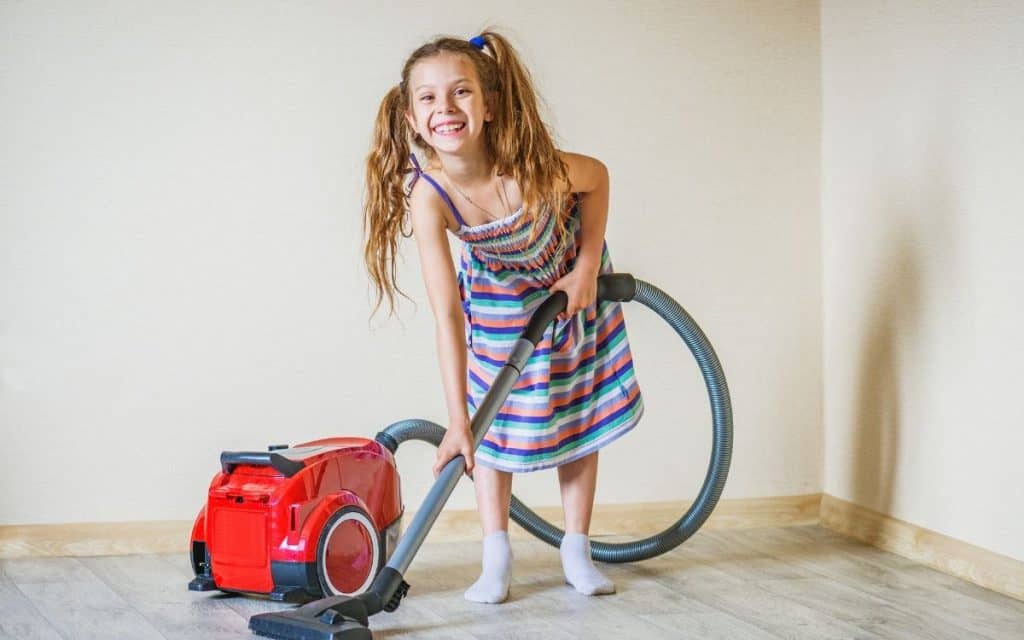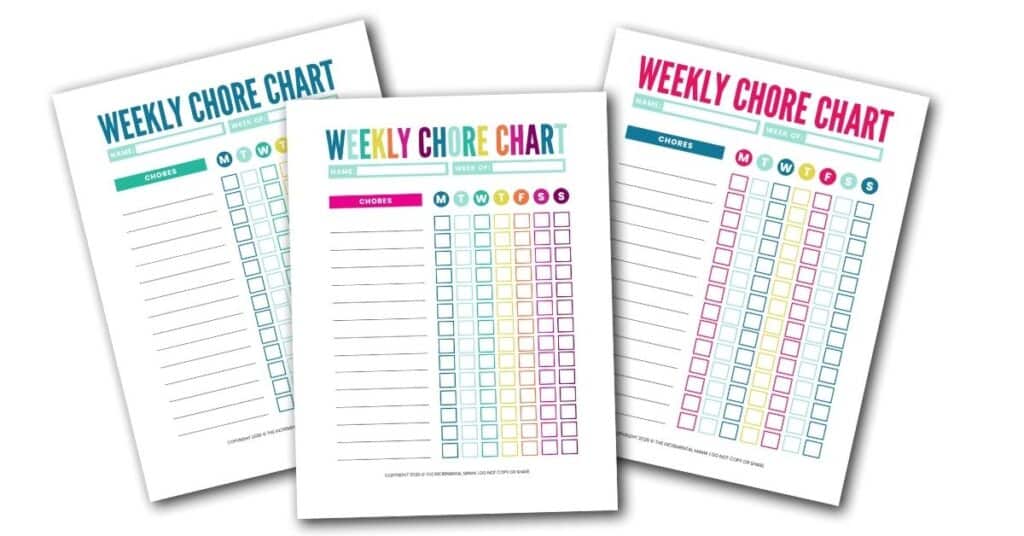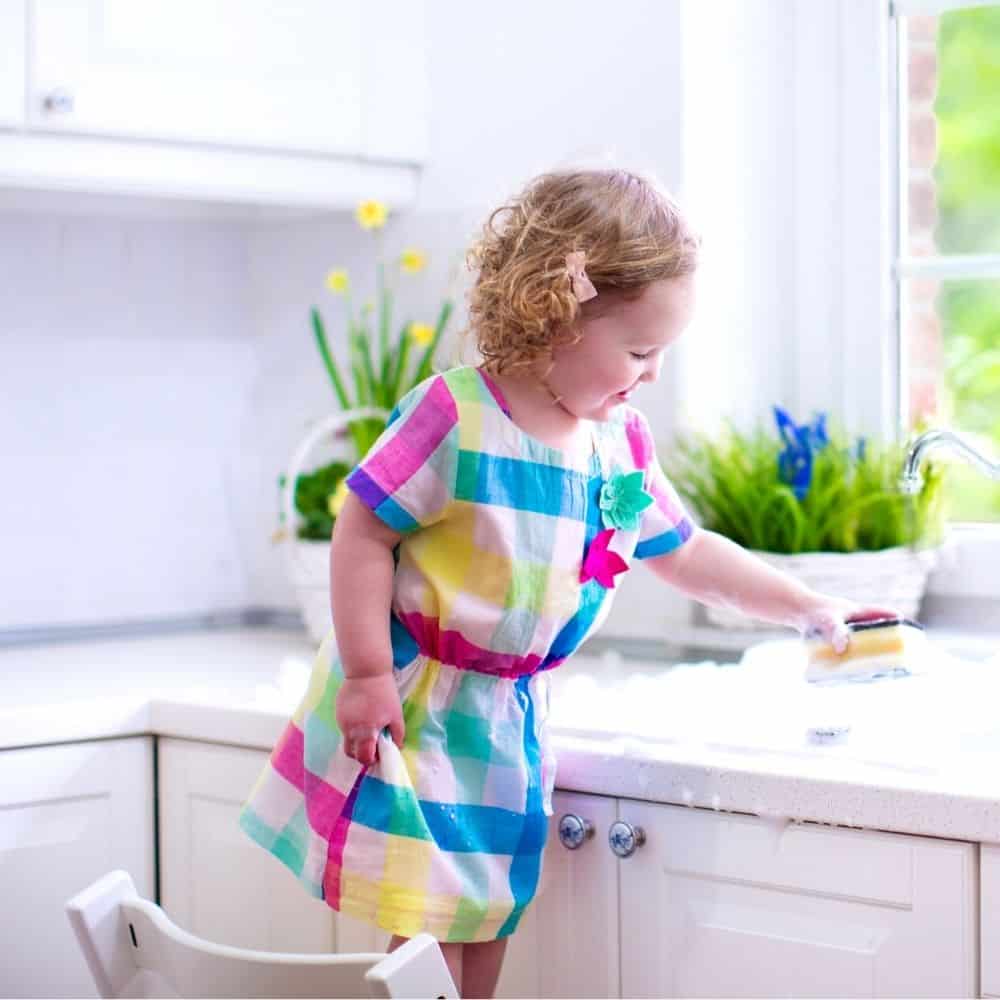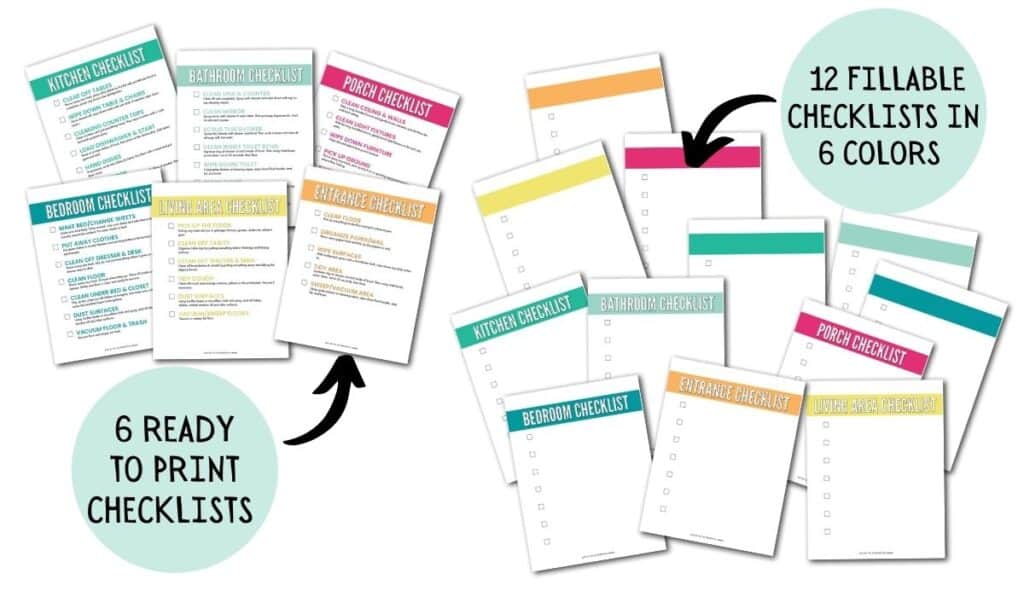If you’ve struggled to get your kids motivated to do chores, you’re far from alone.
I hear constantly from frustrated parents that their kids “just won’t do chores no matter what I do.”
And it’s maddening.
Because you know that doing chores is an important part of raising responsible, capable, and independent kids.
However, it seems like no matter what strategy you try, you end up exhausted after battling your kids, and wishing you’d just have done it all yourself.
But the truth is that you CAN get your kids motivated to do chores. That is, if you can avoid the 5 biggest mistakes parents make when trying to get their kids to do chores.
Not only will we cover those mistakes in this post, but we’ll also cover what you can do instead to create a home environment in where you can get kids to do chores without losing your mind.
Let’s get started!
RELATED: Age-appropriate Chores for Kids

THE BIGGEST MISTAKES PARENTS MAKE TRYING TO GET KIDS TO DO CHORES
Mistake #1: Creating an environment in which kids expect rewards
The problem with many chore systems out there is that they create a “rewards economy”. Or rather, a culture in which the child expects to get something in return for every act of helpfulness.
If you’ve ever asked you kids to do something and been met with “What will you give me?” you know exactly what I’m talking about.
When we create a culture in the home in which everything the child does merits a reward, we inadvertently kill our child’s internal (or intrinsic) motivation.
Because kids learn that they don’t need to do anything unless there is a prize involved.
This is why many experts say that allowance shouldn’t be connected to chores.
ASU psychologist Suniya Luthar says:
“How sustainable is it if you’re going to pay a child a dime for each time he picks up his clothes off the floor? What are you saying—that you’re owed something for taking care of your stuff?”
WHAT TO DO INSTEAD:
- Create a Culture of Helpfulness in Your home. Instead of relying on rewards for all the things, create an environment in your home in which everyone understands that there are lots to do to keep the home running. And every single member of the household is an important part of making sure your home is healthy, happy, and runs well.
- Connect chore to privileges. Create a home structure in which privileges–like screen time, playing with with friends, fun outings–come only when the family member has done their part. For example, “You can watch 30 minutes of TV after you’ve completed your daily chores.
- Have “Celebrations”. Instead of saying “if you do this, then you can have _____” you can instead frame it as a celebration. This strategy works well when encouraging the whole family. For example: “Let’s get all our work done today so we can celebrate by snuggling up, watching a movie, and eating popcorn in our clean house.”
- Separate allowance from chores. Instead of a reward for doing chores, use allowance as a means of showing children how to save, give, and spend on things they care about.
(In our home, we use the awesome allowance system that Ron Leiber, New York Times personal finance columnist, outlines in the book The Opposite of Spoiled: Raising Kids who are Grounded, Generous, and Smart about Money. It’s fantastic.)
In short, You want to create a home environment in which kids help because:
- It feels good to be helpful
- They feel a sense of pride and accomplishment
This is not to say that you can’t use a behavior chart or some kind of system in which kids get privileges for doing their chores, you just want to make sure you’re going about it in a way that teaches responsibility and encourages intrinsic motivation.
For more, check out How to Get kids to Do Chores & Help Out Without Being Asked

Mistake #2: Waiting until kids are older to give chores
When kids are small and actually eager to help out, we often don’t let them. Usually because of how much time it will take to include our little toddler in what we’re doing.
It’ll take a long time to show them how to do it and then clean up their inevitable extra mess from “helping”.
So we decide it’s easier to just do it ourselves and then put off giving chores until kids are old enough to mount an incredible resistance to doing anything extra.

WHAT TO DO INSTEAD:
- Start now. Don’t beat yourself up if you didn’t start earlier. Instead, start now by committing to making changes in your home. No matter what pushback you receive, commit to taking steps to creating a culture of helpfulness in your home.
- Give your kids time to get the hang of the new expectations. Personally, I’ve found that 2 weeks is a typical transition period for most kids adjusting to a new schedule, routine, or expectation. Buckle down and realize that if you can stay strong for 2 weeks of chore enforcement, things are going to really start changing for the better.
Mistake #3: Yelling When Kids Resist or Complain
We all get tired and frustrated from time-to-time and end up losing our cool.
While this 100% understandable, the truth is that the environment we create in the home directly impacts our kid’s actions and feelings.
And this is absolutely the case when it comes to how your kids feel about doing chores.
When you resort to yelling about chores, your child will always associate chores with anger, bad feelings, and negativity.
Yelling at a child to do chores will never result in a child being internally motivated to do chores. Chores will always be a battle of will.
WHAT TO DO INSTEAD:
- Use calm-down strategies to avoid yelling. When you feel the pressure rising, stop and take a few deep breaths or say “I know this is frustrating for you. It’s frustrating for me too. So I’m going to go for a minute and take a few deep breaths and then I’m going to come back and we’ll figure this out.”
- Know your triggers. If certain situations or times of day seem to be more difficult, take note. If you’re tired in the evenings, perhaps your should use morning time to enforce chores.
- Talk to you partner about committing to yell less. Together, devise strategies to both hold one another accountable and stay calm.
Mistake #4: Using A Complicated Chore System
Another common way that parents mess up when it comes to chores is by adopting a complicated chore system that’s hard to understand.
And frankly, I don’t blame any parent that’s done this because I’ve seen plenty of chore systems that looks a little like this:

I myself have read about numerous chore systems described as “Super simple!” only to feel overwhelmed by actually trying to set it up. Like it’d involve hours of prep and craft time to put it together and then explain it to your kids.
And when you use a complicated chores system, it’s easy to throw in the towel. Because the simple truth is that we are more likely to do easy things.
WHAT TO DO INSTEAD:
- Start simple. Start with a handful of basic daily tasks you want your child to complete and work towards helping your child build those new habits. Then gradually add more responsibilities (and privileges).
- Give the same chores daily. As a mom of 4 small kids, trying to change out chores daily was a recipe for disaster. I couldn’t keep up. Now, each kid has the same basic chores and one “extra chore” that I give based on what needs to be done specifically that day.
Mistake #5: Not Giving Kids Clear Expectations
As much as we’d like to think we’re clear and unambiguous in our communication with our children, the truth is that’s not always the case.
Not giving clear expectations comes in 2 parts:
- Not being clear on exactly what you want done
- Not helping kids learn how to complete tasks properly.
And if kids don’t understand what’s expected or are unsure how to actually complete a task, they will resist and complain. Or they’ll just flat out refuse to do it.
WHAT TO DO INSTEAD:
- Use chore charts. Chore charts work because kids need visual reminders and get a sense of accomplishment when they cross things off their list. Just as we are more efficient when we work from a to-do list, chore charts make chores easier for kids.
- Work alongside your kid. Show them how to do the task, get them to try, and praise their efforts.
- Break down difficult tasks. For example, instead of having a child suddenly start unloading and putting away everything in the dishwasher, have them start with silverware or cups. Then gradually add as your child masters each step.
- Use checklists for big jobs. Like chore charts, checklists give visual reminders for each step that needs to be completed. For example, check out the the bathroom cleaning checklist & the bedroom cleaning checklist for kids.
And if you’re looking for more cleaning checklists for kids, check out the Cleaning Checklist Bundle for Kids. It’s got both ready to print checklists and several fillable versions you can customize to perfectly suits your home and family.

- Provide kid-friendly cleaning tools. Giving your kids their own cleaning supplies can be both motivating and also helpful when it comes to setting expectations. Because they can learn how to use each of their tools and supplies. For more, check out how to create a Bathroom Cleaning Kit for Kids.
YOU CAN GET YOUR KIDS TO DO CHORES
While it’s not easy, getting your kids to do chores will result in a happier, more helpful home environment. And you can do that by avoiding the 5 mistakes above and instead establishing healthy habits in your home.
You’ve got this!






Christy says
Thank you for this! I have been working on redoing the chore system now that my kids are a few years older, and this article solved multiple problems I was struggling with!
Erin says
Oh, I’m so glad to hear that Christy!